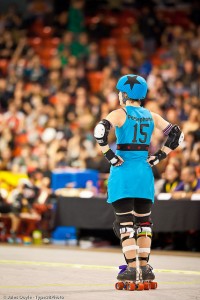Philly vs Gotham ECDX 2011: 14-0 Gotham, third jam of the game. My thoughts on the jammer line: Looks like Gotham wants the back, same as last year. They won’t cross the pivot line until we are at least five feet ahead of them. Super. Fun. Looks like my girls aren’t going for it. *@$# it. Why should they have their way? If everyone adopted this selfish strategy, we would never play roller derby. Ever…Oh cool, the crowds booing. Maybe if I encourage them, Gotham will skate… OK, that didn’t work. I’m so annoyed. I’m gonna ^%*$ talk to Bonnie. Hmm, that didn’t help anything. *@$#. The jam’s over. AAAAAHHHHHH…
Is it justified for the participants of flat track roller derby to destroy gameplay in their quest for victory? Should a natural law be upheld in roller derby, or only the positive law of the written rules? Two recent scenarios from the ECDX raised these questions.
Scenario #1. Gotham lines up inches from the jammer line. Philly lines up inches in front of them. Pack whistle blows. Gotham waits for Philly to skate. Gotham wants the back, and a several feet cushion to maneuver. Philly does not give them the cushion. Philly does not want to surrender the back of the pack, or allow Gotham room to maneuver. Two minutes pass. Jam ends without the jammers released.
Scenario #2. Windy versus Charm, no minors Beta testing: Charm jammer in box. All of the Windy blockers line up behind the jammer line. Pack whistles blows. No pack exists, so jammer whistle blows. Windy jammer skates forward. A Charm blocker engages, and she is called off on a major penalty for out of play engagement. Windy jammer skates past Charm blockers, and eventually the Windy blockers. A Windy blocker is called out on a major illegal procedure. Pack not reformed until Charm blockers skate around the track to meet up with stopped Windy blockers.
The above scenarios can be considered examples of gameplay destructive strategies. Gameplay destructive strategies are strategies that result in an absence of jammer inclusive, interactive pack play with predominantly forward motion. Many more examples of this type of play exist than the two described above, with many other leagues involved.
In scenario #1, Gotham’s insistence on their strategy execution, in combination with Philly’s insistence on not allowing Gotham to execute their strategy, resulted in a truly jammerless jam. There are no rules in place to force the pack to move forward. So they did not, for an entire jam.
In scenario #2, Windy’s goal of maximizing their jammer’s advantage time during a jammerless jam leads them to purposefully create a disjointed destruction of pack that existed for an entire revolution of the track.
Women’s Flat Track Roller Derby and its rule set are relatively new compared to most other sports. As a young sport, the rules are brimming with loopholes. If one agrees that flat track roller derby should consist of jams with performing jammers and interactive blockers in predominantly forward motion, it would follow that the
exploitation of the rules that result in gameplay destruction is contrary to the intention of the sport. Players, managers, and coaches should operate above the word of the law. They should recognize gameplay destructive strategies and avoid them. This behavior would be a matter of keeping the true nature of the game intact. It also would be a matter of good sportsmanship.
Conversely, flat track roller derby can be viewed as an intellectual, academic survival of the fittest, rather than a physical triumph of the fittest. So, the best of the best are able to detect a weakness in the rules and officiating, that they manipulate to their advantage.
Some teams figure that if they do not exploit the rules, the other teams will. They are frightened that the loopholes will be used against them. They think it is the job of the WFTDA rules committee to close up the loopholes, not their obligation to ignore them. The next WFTDA rules revision does not occur until 2012. WFTDA seems to be on an every two years revision schedule. So, loopholes might possibly be closed every two years. Two years is a long time for something to maybe happen.
Fans have made it clear that they dislike gameplay destructive strategies. One only needs to check out slowderbysucks.com, or listen to the booing from spectators during gameplay destructive strategy execution, to come to this conclusion. If one believes sports should be enjoyed by spectators, this situation is concerning. There are a few solutions to this problem. Skaters, coaches, and managers can decide not to partake in gameplay destructive strategies. This option probably will not happen.
Another option would be to change the rules. Ideally, the rules would be changed as they were identified to be faulty, rather than in the unforeseeable future. WFTDA should develop a promptly responsive rules revision system.
Ideally, both will happen. Skaters, coaches and managers, let’s play some *@$#’ing jammer inclusive, blocker interactive roller derby with predominantly forward motion. WFTDA, help us help ourselves.
*****
Persephone is a member of the Philly Roller Girls. She has been competing
* with the Liberty Belles since 2006. Any opinions expressed above are hers*
* alone, and do not reflect the viewpoint of the Philly Roller Girls or the*
* Liberty Belles.*
